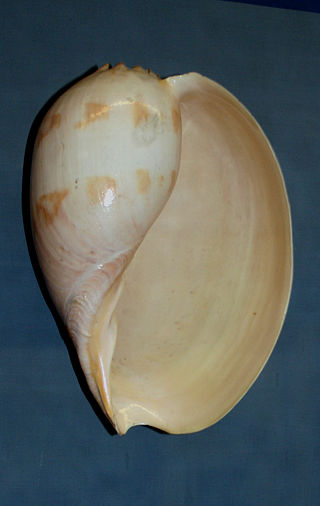
A seashell or sea shell, also known simply as a shell, is a hard, protective outer layer usually created by an animal or organism that lives in the sea. Most seashells are made by mollusks, such as snails, clams, and oysters to protect their soft insides. Empty seashells are often found washed up on beaches by beachcombers. The shells are empty because the animal has died and the soft parts have decomposed or been eaten by another organism.

Sea snails are slow-moving marine gastropod molluscs, usually with visible external shells, such as whelk or abalone. They share the taxonomic class Gastropoda with slugs, which are distinguished from snails primarily by the absence of a visible shell.

Volutidae, common name volutes, are a taxonomic family of predatory sea snails that range in size from 9 mm to over 500 mm. They are marine gastropod mollusks. Most of the species have no operculum.

Conus gloriamaris, common name the Glory of the Sea Cone, is a species of sea snail, a marine gastropod mollusk in the family Conidae, the cone snails, cone shells or cones. It is commonly found in the Pacific and Indian Oceans.

Melo amphora, common name the Diadem volute, is a very large sea snail, a marine gastropod mollusc in the family Volutidae, the volutes.

Melo is a genus of extremely large sea snails, marine gastropod molluscs in the family Volutidae, the volutes. Because of their huge ovate shells, these snails are often known as "bailers" or "melons".

Melo miltonis, the southern bailer or southern baler, is a large sea snail, a marine gastropod mollusc in the family Volutidae, the volutes.

Melo melo, common name the Indian volute or bailer shell, is a very large edible sea snail, a marine gastropod mollusc in the family Volutidae, the volutes.

Cymbiola vespertilio, common name the bat volute, is a species of large predatory sea snail, a marine gastropod mollusk in the family Volutidae, the volutes.

Cassis cornuta, common name the horned helmet, is a species of extremely large sea snail, a marine gastropod mollusc in the family Cassidae, the helmet shells and their allies.

Hexaplex cichoreum, common name the "endive murex", is a medium-sized species of sea snail, a marine gastropod mollusk in the family Muricidae, the murex shells or rock snails.

Melo aethiopicus, common name the crowned baler, is a very large sea snail, a marine gastropod mollusc in the family Volutidae, the volutes.

Conus broderipii is a species of sea snail, a marine gastropod mollusk in the family Conidae, the cone snails and their allies.

Cymbiola aulica, also known as the princely or courtier volute is a species of sea snail, a marine gastropod mollusk in the family Volutidae, the volutes.

Cymbiola imperialis, the imperial volute, is a species of sea snail, a marine gastropod mollusk of the genus Cymbiola in the family Volutidae, the volutes.

Cymbiola nobilis is a species of sea snail, a marine gastropod mollusk in the family Volutidae, the volutes. The snail's shell is commonly collected in the sea shell trade, which has resulted in overharvesting of the snail.

Lyria planicostata is a species of sea snail, a marine gastropod mollusk in the family Volutidae, the volutes.

Lyria michardi is a species of sea snail, a marine gastropod mollusk in the family Volutidae, the volutes.

Tutufa (Tutufa) bubo, common name the "giant frog snail" or "giant frog shell", is a species of extremely large sea snail, a marine gastropod mollusk in the family Bursidae, the frog shells.

Xenophora pallidula, the pallid carrier shell, is a species of large sea snail, a marine gastropod mollusc in the family Xenophoridae, the carrier shells.




















